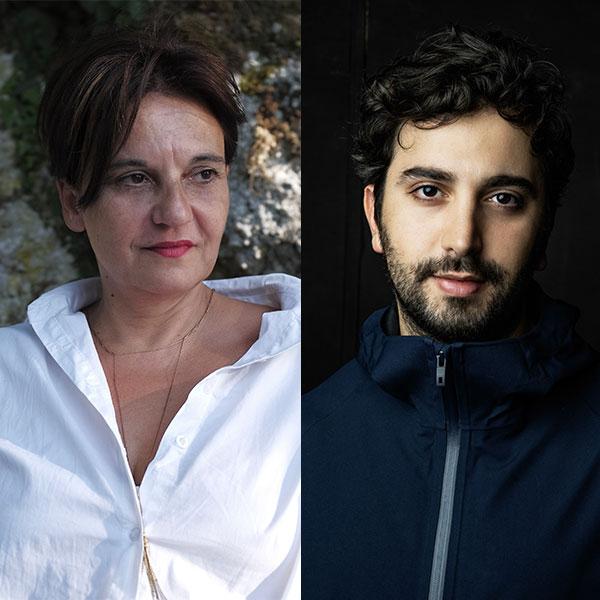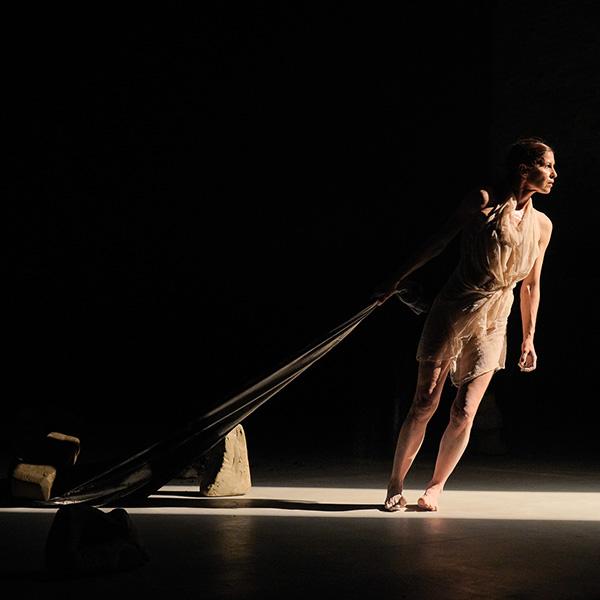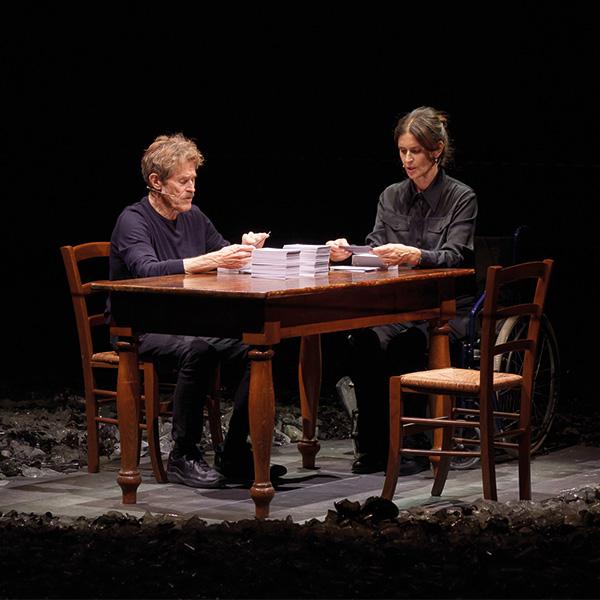
Biennale Teatro 2020: on stage from 14 to 25 September
The 48th International Theatre Festival is titled Nascondi(no) (Hide-and-seek) and features 28 titles (all world premieres) and 40 performances.
The Festival
Conceived as an “Italian Theatre Pavilion”, the 48th International Theatre Festival organized by Director Antonio Latella is a collective exhibition of Italian artists on stage from September 14th to 24th in Venice, with 28 titles for 40 performances, all world premieres, addressing a single theme, censorship.
“Over the past three years, I have wanted to highlight international artists to introduce to Italian audiences, and thus to Italian artists. Fostering direct contact through our programming, a cross-pollination that can enrich the terrain of our experimentation.
For me, the fourth year became for spotlighting Italian theatre. We tried to construct a mapping of artists who stand outside these laws and are rarely programmed by institutional theatres, but who are attracting the attention of critics and professionals in the field; artists who, above all, are building their own audiences, wide-ranging audiences that are not bound by the constraints of theatre subscriptions.
Many of the invited artists are young, some indeed very young, fresh out of the Director’s College of the Biennale (to promote the work we have done over these years, taking the responsibility to try and launch new Italian talents), and others who are bigger but only in terms of age”.
The artists
Leonardo Lidi, Fabio Condemi, Leonardo Manzan, Giovanni Ortoleva and the winner of the 2019/2020 edition Martina Badiluzzi are the directors who have emerged from the Biennale College hothouse: born on the cusp of the ‘80s and ‘90s, they each have their own personality, a well-defined language with which they write the theatre of our day. Joining them is Caroline Baglioni, winner of the College Authors Under 40. Close to them, in terms of generation, are Pablo Solari – director, playwright, musician and the author of web series with his satirical group “Il terzo segreto di satira” – and Alessandro Businaro, a director and author.
The companies that will be at the Festival, all founded in the new millennium, are independent groups gathered around an idea, a way of making theatre that departs from the ordinary. From the duo AstorriTintinelli, authors of sarcastic adaptations of classics who were inspired by Ceronetti and Leo De Berardinis, to Biancofango, one of the most highly appreciated groups today; from Industria Indipendente, an experimental collective dedicated to the performing and visual arts, to Babilonia Teatri, winners of the Silver Lion at the 2016 Biennale di Venezia; from Nina’s Drag Queens, who offer an ironic and hyper-expressive reinterpretation, in drag, of the classics of the theatre tradition, to the Teatro dei Gordi, actors and actresses from the Scuola “Paolo Grassi” in Milan directed by Riccardo Pippa, and the newest all-female company UnterWasser, founded in 2012 by Valeria Bianchi, Giulia De Canio and Aurora Buzzetti, performers, authors, creators and builders of the props for their works, “mobile installations” on the border between theatre and contemporary art.
Pursuing their own independent experimentation are Daniele Bartolini, Filippo Michelangelo Ceredi, Liv Ferracchiati, Antonio Ianniello and Giuseppe Stellato.
From Florence to his “spontaneous” immigration to Canada, Daniele Bartolini addresses today’s issues with the active participation of the audience in site-specific and immersive performance contexts; the visual artist, filmmaker and performer Filippo Michelangelo Ceredi, who also holds a degree in philosophy and was an assistant director to Marco Bechis, creates live installations before the eyes of the audience establishing a circuit between images from the archives and collective memory; Liv Ferracchiati, who brought his Trilogy on identity to the Biennale Teatro 2017, is a director and the author of his plays; Antonio Ianniello, an actor, playwright and director who has studied perception, has developed strange tools, devices that make it possible to observe one’s own cognitive processes; Giuseppe Stellato, an artist and set designer, the author of a performance cycle about the relationship between man and machine, the first phases of which were seen at the Biennale.
There are also artists consolidated on the national scene such as Fabiana Iacozzilli, who captured attention with theatre supported by a powerful visual and dramatic structure; Giuliana Musso, one of the finest exponents of narrative and investigative theatre, that lies on the edge of investigative journalism, both investigation and poetry, exposé and comedy; Jacopo Gassmann, who works in theatre and film, and has drawn attention to new plays that have been successful in Italy, thanks in part to his translations.
Finally, Mariangela Gualtieri, a poet, actress and author who was instrumental in the renewal of Italian theatre in the 1980s. She will inaugurate the 48th International Theatre Festival with one of her precious “sound rituals”, as always led by Cesare Ronconi, a ritual conceived as an inauguration.
The Lions
The Lions for Theatre this year seek to reward “artists who give and do so much for theatre – explains Latella – but often remain in the background, in part because of the director, sometimes too controlling, who forgets that the final outcome is often dependent on the collaborators he chooses”.
The Golden Lion for Lifetime Achievement has been awarded to Franco Visioli, the sound designer who worked with Thierry Salmon, Peter Stein and above all Massimo Castri, before collaborating with Latella. “His dramaturgies are actual scripts on top of the written plays, creating synergic relationships that enhance the fundamental steps by the author and director” (from the motivation).
The Silver Lion has been awarded to Alessio Maria Romano, the director and choreographer who has worked on the stage movement for productions by Luca Ronconi, Carmelo Rifici, Valter Malosti and Sonia Bergamasco, among others, in addition to his commitment to the pedagogy of movement, to train actors by «teaching the actors what they need to know, especially the new figure of the actor-performer, awareness of their own body, and how a gesture in theatre can be more incisive than a spoken line” (from the motivation).
The performances
“All the artists – writes Latella – were asked to work on the theme of censorship, trying to look beyond the obvious in this proposal to think of it as a “superior” value to present to the audience and to the professionals in the field, in the belief that Italian theatre people find it difficult to break into the international market, and they are therefore, in some way, censored merely by the fact of being Italian theatre people“.
Among the many approaches to the theme, some directors and companies have found inspiration in “scandalous” authors.
Philosophy in the boudoir by the Marquis De Sade for Fabio Condemi, who previously directed Bestia da stile and Jakob Von Gunten, extends his explorations of texts about ‘reverse coming of age’ and about “authors who are inclined (or cursed) to leave the world and disappear, leaving traces behind them we can’t seem to get rid of”. In Biancofango’s imagination, Lolita, from Nabokov, “is a word in the dictionary, a young girl whom each of us has known at least once in our lives, a myth, a figure of speech, a prohibition, an inexplicable implicit, a scandalous event, a minor crime news story, a sin” and so much else. In Eh!Eh!Eh! Raccapriccio, based on Baudelaire’s Flowers of Evil, AstorriTintinelli imagine “a performance that has an inebriated, Luciferian aura… a place that is as reminiscent as possible of a sacred space, with an atmosphere of mystery and dusk where two creatures experience horror and disgust as they debate the transience of life”. La città morta, considered to be Gabriele D’Annunzio’s failed attempt at rewriting Greek tragedy, is now staged by Leonardo Lidi with “considerations on the censorship that D’Annunzio the playwright was and continues to be subject to, a censorship that – given the elusiveness of the text for the stage– seems almost to be suggested by the poet himself”. I rifiuti la città e la morte by Fassbinder, the most scandalous case of censorship in Germany in the 1970s, written in 1975 and staged in Germany only 34 years later, is for director Giovanni Ortoleva “the story of a modern Passion of Christ… A text that is both blasphemous and religious, that crucifies a figure whom the Bible might have placed at Christ’s feet”.
In other cases, the artists, asked to address the theme of censorship, were inspired by historical figures or political, social and psychological themes that allow them to look at reality through a magnifying glass.
George II, written by Stefano Fortin and directed by Alessandro Businaro, addresses history and the world of the American President, seen as “a Shakespearian prince”, to question “post-truth as the new frontier of censorship, its implacable and elusive control technique”. Elia Kazan. Confessione Americana, freely inspired by the director’s controversial life story, for playwright Matteo Luoni and director Pablo Solari is “a story that talks about the compromises we are all forced to make at least once in our lives: a choice for which there is no salvation. Whatever you do, you lose. With no friends or weapons, Elia will have to come face to face with his vocation all alone, if he is to truly understand who he is, or who he has become”. Una cosa enorme by Fabiana Iacozzilli explores the processes of “self-deceiving censorship” that concern women on a theme as crucial as maternity: “In building it – stated the director – I am feeding on Sheila Heti, Orna Donath and my encounters with the facts and stories of others, people I have reached out to, but who more often have reached out to me”. Dentro (una storia vera, se volete) by Giuliana Musso is a work about concealing violence, a true story of child abuse: “An experience that is hard to listen to. A mother who discovers the worst of truths. A daughter who hates her mother. A father who is innocent until proven guilty. And a slew of therapists, consultants, educators, doctors, social assistants, lawyers who aren’t interested in the truth”. The right way, a performance by Daniele Bartolini with his company DopoLavoro Teatrale, focuses on the negative effects of political correctness. “After living in Canada for seven years – says the author – all of this has involved me as well, I am perfectly integrated; every day I must deal with thought that suggests what it is right to do and what it is legitimate to think, a voice that I can choose to heed or ignore, but that still speaks and expresses judgment. In Eve #2, Filippo Michelangelo Ceredi offers an artistic answer to the widespread communicative violence that is rife in the media and in political discourse: “a process to piece the fragments of the contemporary era back together with the personal dimension of the audience and with the possibility of initiating a vital process of collective memory”. Automated Teller Machine by Giuseppe Stellato concentrates on the relationship between man and machine, where the machine this time is an ATM: “a machine with a significant symbolic potential, that forces us to question the power of an element that is as concrete as it is abstract, and is often the basis for many of the controversies in our society: money”. The performance Nanaminagura, conceived by Antonio Ianniello, is about the world of air guitar competitions, where the winners are masters in playing an imaginary electric guitar, like Nanami Nagura in the title.
Other titles in the Festival refer to a veto, a prohibition, a restriction highlighted in the title.
Natura morta by Babilonia Teatri was supposed to put a group of children onstage: “We should have been creating a peformance with a group of children. We decided not to give life to the performance, not to submit to social rules totally incompatible with the project we had in mind. Once this step was taken, we decided to take another one. Once the children had exited the stage, we decided to exit too, to leave the stage completely empty”.
Non dire / Non fare / Non baciare are three stories told by the student directors, actors and playwrights of the Accademia d’Arte Drammatica “Silvio D’Amico” under the guidance of Francesco Manetti, who takes upon himself the role of the censor. “Three stories, three examples, three symbols of how the expression of certain thoughts (non dire - do not say), the freedom to make certain choices (non fare – do not do), the relationship with the body, especially the female body (non baciare – do not kiss) are limited, underhandedly controlled, guided in reassuring standardized environments”. Untold by the UnterWasser collective explores the defence mechanisms, the screens that individuals put up to protect themselves from destruction, from the disaggregation of one’s ego and the encounter with one’s own monsters, created and fuelled by fear and pain. Bye Bye by Alessio Maria Romano imagines a group of users who “move and dance the body in a cyclical system of actions, an obsessive merry-go-round of physical actions in which the undo option available in all computers, performs the precise and subtle task of going back, erasing, eliminating all traces, details and perhaps retrieving them later. What is left after you press undo? What causes the undo action and how does one interpret what it leaves behind? Who decides to use it and when?”.
In some cases the theme of censorship is visualized in a place, a landscape, a physical space: such as Pandora by the Teatro dei Gordi directed by Riccardo Pippa, who encloses within a bathroom – in a factory, a subway station, an airport, a club, a gas station – “an amoral, suspended space, of great violence and nudity, a shared space of interiority in which to expand the spectrum of daily life beyond all limits and censures“; or such as Klub Taiga by Industria Indipendente, where the Klub is a place for the counterculture and the taiga evokes the “image of the untouched, the inhospitable, the unwanted, as a place that is antithetical to the imagined or fantasized tropical dream”; or Glory Wall by Rocco Placidi directed by Leonardo Manzan, who analyses everything there is behind a wall, wondering if “one can feel the real nature of a space behind the wall, or if one can feel the real nature of what takes place behind the fourth wall, if it is still possible to draw enjoyment from theatre. Freedom is a wall. And beyond it lies the principle of pleasure”.
Apparently unrelated to the idea of censorship, authors such as Anton Chekhov, Thomas Mann, Tomasi di Lampedusa and the relatively unknown, for Italy, Arne Lygre, were the starting point for some of the invited directors.
La tragedia è finita, Platonov is a reinterpretation by Liv Ferracchiati, who returns to a love of his youth with Chekhov’s character, attracted to “the apparent lack of self-censorship, in his thoughts, his impulses”; Ultima Latet takes its cue from the sanatorium of Mann’s The Magic Mountain which the author and director Franco Visiola also views as “an unknown and hence feared place, a place where censorship is exercised in reverse. Here they censor the sane… The patient becomes the protagonist by virtue of the illness he carries that drives him to introspection, wondering to what limit can one go to confront, when necessary, the final moment”; in Le Gattoparde (L’ultima festa prima della fine del mondo) the Nina’s Drag Queens draw inspiration from Tomasi di Lampedusa’s book “The Leopard” to reconsider the immutability of power, transporting nineteenth-century Italy into the economic boom of the 1960s; Niente di me - uno studio, by one of the greatest Scandinavian authors, Arne Lygre, staged by Jacopo Gassmann, is perhaps an extreme attempt by the literature of the theatre to reach beyond the confines of the unsaid within a couple’s relationship; but is not censoring the hidden truths of love really an act of freedom?
Biennale College Teatro
Initiated in 2012 in all the Departments of La Biennale di Venezia with the goal of promoting young artists, entrusting them with the development of new creations in contact with the Masters, the Biennale College – Theatre, under the guidance of Antonio Latella, has been structured in three sections: one dedicated to directors under 30, one to authors under 40, which ends this year, and one to workshops.
Directors Under 30
Conceived to give voice and visibility to those working in the theatre in Italy, taking into account the difficulties of breaking through and the generation gap, the directors’ section of the Biennale College takes place over the course of two years. The third edition, spanning 2019 and 2020, will therefore end with the presentation of a performance within the 48th International Theatre Festival as the fourth edition gets underway (2020/2021). Martina Badiluzzi, the winner of the third edition of the Biennale College Directors under 30, will present The Making of Anastasia, inspired by one of the most famous and fascinating cases of mistaken identity of the twentieth century, with a company of five actresses, whose personal stories mesh with those of the presumed Anastasia. The play, produced by La Biennale di Venezia, will feature an all-female cast and crew, under the tutorship of the Director Antonio Latella and his collaborators.
The call for the fourth edition of the Biennale College – Directors, which spans the two-year period 2020-2021, was launched in November and received 93 submissions for the first selection. 30 applicants were admitted for the interview, leading to the selection of 11 directors: Alessandro Padovani, Ian Bertolini, Giulio Cavallini, Richard Pareschi, Michele Segreto, Giulia Odetto, Federica Amatuccio, Arianna Di Stefano, Elvira Scorza, Paolo Costantini, Gianmaria Borzillo. They will be asked to present the first part of their work (20 to 30 minutes long) to the students and masters participating in the activities of the Biennale College Workshops 2020. This last presentation will determine the winner of the production prize described in the Call.
Authors Under 40
The staging of Il lampadario by Caroline Baglioni will conclude the Biennale College Authors Under 40 at the end of an experience that lasted three years (2018/2019/2020), in which the participants were tutored by two nationally-renowned authors: Linda Dalisi and Letizia Russo.
The direction of Caroline Baglioni’s play has been entrusted to Leonardo Lidi, who was the first to win the Call for young directors under the age of thirty, merging the experiences of the Biennale College Theatre into a single track.
The author writes: "Il Lampadario" is a metaphor for an existential and physical condition: when hanging upside down the world is upended; it takes on new forms and follows inconceivable paths. When the blood flows into your brain, you could even deceive, invent a life, bring time to a standstill, stop at just that moment when everything could still happen but how long can you feed an illusion?".
Workshops
This year’s workshops are an integral part of the festival, conceived on the basis of the theme everyone will address. “We felt the need to gather the classes into three thematic groups, to avoid being distracted from the key issue. We therefore chose two sectors of the theatre which, in some way, have a real power to censor, if their choices are not strongly motivated… The two classes I am talking about focus on artistic direction and theatre criticism. What kind of censorship do I enact when I choose to programme a festival, a national theatre, a theatre season? Are the choices really free of any influence? What censorship do I enact when I write a review and how truly independent is it in portraying what I saw at the theatre? To what extent have theatre directors influenced the success and popularity of some theatre people, and to what extent, in the same way, have critics been responsible for the success or failure of certain artists?” (A. Latella)
Umberto Angelini, Superintendent and Artistic Director of the Fondazione del Teatro Grande in Brescia and curator at the Triennale di Milano for the theatre, dance, music and performance sector, and Claudia Cannella, director of the monthly theatre magazine Hystrio who has written about theatre for twenty years in the daily newspaper Corriere della Sera, are the tutors for artistic direction and theatre criticism.
The only workshop to have a public outcome is the third one, held by director, choreographer and educator Alessio Maria Romano, winner of the Silver Lion in this edition of the festival. “We have chosen a pedagogist, who is truly that despite his young age, because we are aware of the extent to which, even in education, a Master is naturally led to censor; the Master we have brought in, however, is so solid that we believe that each censorship that he applies corresponds, in his choices, to an enhancement of the talent of each individual student. Noi wish is the title of the performance that will conclude the workshop by Alessio Maria Romano, open to actors, dancers and performers as well as directors, dramaturgs, choreographers and musicians with an interest and aptitude for movement.
The call for applications is now online at the address www.labiennale.org/en/theatre/2020/biennale-college-teatro-2020-workshops through July 12th.
Our thanks
We would like to thank the Ministry for the Cultural Heritage and Activities and the Regione del Veneto for the support granted to the programmes of the Dance Music and Theatre Departments of La Biennale di Venezia.




